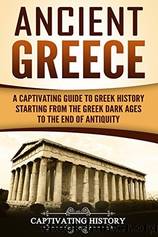Ancient Greece: A Captivating Guide to Greek History Starting From the Greek Dark Ages to the End of Antiquity by Captivating History

Author:Captivating History [History, Captivating]
Language: eng
Format: epub
Tags: History
ISBN: 9781647484897
Google: jcBMzQEACAAJ
Amazon: B079CPKK4N
Goodreads: 38221839
Publisher: #PrB.rating#3.95
Published: 2018-01-26T00:00:00+00:00
Chapter 8 â Great Minds of Ancient Greece
While wars waged around them, some ancient Greeks chose not to become Kings or Warriors. Instead, they elected to use their minds to advance Greek culture, making discoveries, and writing works that are still relevant today.
In the world of literature and theatre, Greek poets and playwrights created significant works. One, Aeschylus, is considered âthe father of tragedy,â named as such because that genre mainly began with his plays. Aeschylus also changed the way plays were constructed. He wrote scripts with more characters, which allowed for more complex conflict among them. Sadly, although records indicate he wrote approximately 90 plays, only seven have survived. Even among those, some question the authorship, as to whether Aeschylus wrote them or another playwright.
Other celebrated playwrights of the time included Sophocles and Euripides. Both also wrote in the tragedy genre. Records suggest Sophocles wrote at least 120 plays, but like Aeschylus, only seven survive. His style included even more well-developed characters. Euripides likely wrote 92 plays. Like his colleagues, just some survive and among those the authorship is debated. Euripides enjoyed slightly more popularity during his time, and he also used his status to advance other theatrical innovations. For example, he started representing mythical heroes as more ordinary people. This allowed him to explore the inner life and motives of his characters. It also allowed for more romance and comedy, which expanded play genres and made the theatre more complex.
In the related world of poetry, many poets wrote great works during ancient Greece. Perhaps most famous among these was, Pindar. He was considered âby far the greatest, in virtue of his inspired magnificence, the beauty of his thoughts and figures, the rich exuberance of his language and matter, and his rolling flood of eloquence.â Today, his poetry may seem peculiar to modern readers, but it was characteristic of the time.
In the world of art, artists were creating great works. Perhaps most renowned among these was Phidias. He was a painter, sculptor, and architect who advanced Classical Greek designs. Legend tells of a great statue of Zeus at Olympia that he made. It is known as one of the Seven Wonders of the Ancient World. He also made his marks at the Athenian Acropolis, with sculptures of the goddess Athena. Unfortunately, many of his great works were lost or destroyed. They have been best studied through replicas and the excavation of his workshop, which contained moulds for his bronze statues.
Greek mathematicians also had a long history of success. An early mark on the tradition was made by Euclid of Alexandria. He is considered the founder or father of geometry. He wrote a textbook, Elements, which was still used until the 20th century.
Archimedes was not only a mathematician, but he was also an astronomer, physicist, engineer, and inventor. Some consider him the greatest mathematician of all time. He provided many geometrical theorems, regarding the surface area, the area of a circle, and the volume of a sphere. He also offered an accurate approximation of Pi.
Download
This site does not store any files on its server. We only index and link to content provided by other sites. Please contact the content providers to delete copyright contents if any and email us, we'll remove relevant links or contents immediately.
| Administration | Assessment |
| Educational Psychology | Experimental Methods |
| History | Language Experience Approach |
| Philosophy & Social Aspects | Reform & Policy |
| Research |
The Art of Coaching Workbook by Elena Aguilar(48335)
Trainspotting by Irvine Welsh(20082)
Twilight of the Idols With the Antichrist and Ecce Homo by Friedrich Nietzsche(17720)
Fangirl by Rainbow Rowell(7843)
Periodization Training for Sports by Tudor Bompa(7341)
Change Your Questions, Change Your Life by Marilee Adams(6654)
This Is How You Lose Her by Junot Diaz(5798)
Grit by Angela Duckworth(4746)
Red Sparrow by Jason Matthews(4683)
Asking the Right Questions: A Guide to Critical Thinking by M. Neil Browne & Stuart M. Keeley(4599)
Paper Towns by Green John(4177)
Room 212 by Kate Stewart(4113)
Ken Follett - World without end by Ken Follett(3981)
The Sports Rules Book by Human Kinetics(3597)
Housekeeping by Marilynne Robinson(3419)
The Motorcycle Diaries by Ernesto Che Guevara(3344)
Introduction to Kinesiology by Shirl J. Hoffman(3305)
Exercise Technique Manual for Resistance Training by National Strength & Conditioning Association(3298)
Double Down (Diary of a Wimpy Kid Book 11) by Jeff Kinney(3284)
